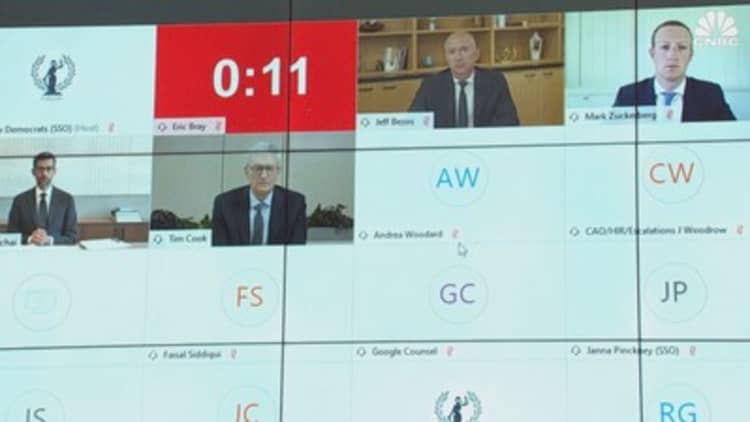
Big Tech could have trouble ahead.
While Wednesday's hearing before the House Judiciary subcommittee on antitrust — which saw the CEOs of Amazon, Apple, Facebook and Google parent Alphabet testify remotely before Congress — didn't reveal much in the way of new information on some of the world's most valuable companies, some believe it could be the start of a painful journey.
The CEOs, testifying together for the first time ever, defended their companies' competitive positioning and called attention to what they said were healthy rivalries in their various industries.
All four companies are scheduled to report earnings for their most recent quarter after Thursday's closing bell.
Here are some highlights from each tech titan's testimony:
Mark Zuckerberg, Facebook chairman and CEO
Zuckerberg largely fielded questions regarding Facebook's acquisitions of Instagram and WhatsApp.
"I recognize that there are concerns about the size and power of tech companies. Our services are about connection and our business model is advertising, and we face intense competition in both. Many of our competitors have hundreds of millions or billions of users. Some are upstarts, but others are gatekeepers with the power to decide if we can even release our apps in their app stores to compete with them."
Asked whether Instagram should be spun off if its 2012 purchase was proven illegal, Zuckerberg shot back:
"I think the FTC had all of these documents and reviewed this and unanimously voted at the time not to challenge the acquisition. I mean, I think with hindsight, it probably looks … obvious that Instagram would've reached the scale that it has today, but at the time it was far from obvious."
All in all, the Facebook CEO saw Big Tech's growth as competitive by nature.
"When Google bought YouTube, they could compete against the dominant player in video, which was the cable industry. When Amazon bought Whole Foods, they could compete against Kroger's and Walmart. When Facebook bought WhatsApp, we could compete against telcos who used to charge 10 cents a text message, but not anymore. Now people can watch video, get groceries delivered and send private messages for free. That's competition."
Tim Cook, Apple CEO
Cook was also peppered with questions about Apple's dominance in its industry.
"When customers consistently give iPhone a 99% satisfaction rating, that's the message they're sending about the user experience. But we also know that customers have a lot of choices and that our products face fierce competition. Companies like Samsung, LG, Huawei and Google have built successful businesses with different approaches. We're OK with that. Our goal is the best, not the most. In fact, we don't have a dominant share in any market or in any product category where we do business."
He also characterized the industry's battle over developers as a "street fight for market share."
"There's a competition for developers just like there's a competition for customers. And so, the competition for developers, they can write their apps for Android or Windows or Xbox or PlayStation. So, we have fierce competition at the developer side and the customer side, which is essentially ... so competitive I would describe it as a street fight for market share in the smartphone business."
Sundar Pichai, Alphabet CEO
Pichai was asked to address the Google parent's sweeping influence worldwide and particularly in China:
"We have a very limited presence in China. We don't offer any of our services — search, Maps, Gmail, YouTube, etc. — in China. And with respect to music, we license content there. In fact, we license content from other companies, and so, this is a dispute between Genius and the other companies."
He also spoke briefly on how Alphabet uses its data.
"Just like other businesses, we try to understand trends from data which we can see and we use it to improve our products for our users."
Jeff Bezos, Amazon founder, president and CEO
In his first-ever congressional testimony, Bezos was asked if he personally signed off on Amazon's plan to raise prices on certain items after limiting its competition.
"I don't remember that at all. What I remember is we matched competitive prices and I believe we followed Diapers.com. Again, this was 11 years ago, so, you're asking a lot of my memory, but I believe we followed Diapers.com. I can also tell you after we bought Diapers.com, we put more than $300 million into trying to make it successful."
The Amazon executive was also asked by Rep. Lucy McBath, D-Ga., to comment on small businesses approaching Congress because Amazon "simply won't listen to them."
"Well, I'd say that's not acceptable. If we aren't listening to you, I'm not happy about that at all. But … if you would allow me to disagree a little bit with a piece of this, I do not think that's systematically what's going on. And the evidence that I would suggest [that] would be useful for you to consider in that regard is that third-party sellers, in aggregate, are doing extremely well on Amazon."






